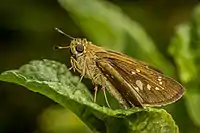Borbo cinnara
Borbo cinnara, commonly known as the rice swift,[2] Formosan swift or rice leaf folder,[3] is a butterfly belonging to the family Hesperiidae. It is found in Sri Lanka, India, Myanmar, Vietnam, Cambodia, Taiwan, and Australia.[2][4][5]
| Rice swift | |
|---|---|
_on_a_leaf.jpg.webp) | |
| Scientific classification | |
| Domain: | Eukaryota |
| Kingdom: | Animalia |
| Phylum: | Arthropoda |
| Class: | Insecta |
| Order: | Lepidoptera |
| Family: | Hesperiidae |
| Genus: | Borbo |
| Species: | B. cinnara |
| Binomial name | |
| Borbo cinnara | |
| Synonyms | |
| |
Description
Above thorax and bases with inconspicuous greenish clothing. Usually upperside forewing with a conspicuous non-hyaline spot in space 1b, discal series in spaces 2, 3, 4 and apical dots in spaces 6, 7, 8, as well as an upper cell spot. Upperside hindwing with I or 2 dots. Underside hindwing with olive-ochreous scaling and spots in spaces 2, 3, 6. F 15-16 mm.
— William Harry Evans, A Catalogue of the Hesperiidae from Europe, Asia, and Australia in the British Museum[5]
Larvae are known to feed on Setaria barbata, Axonopus compressus, Rottboellia cochinchinensis and Brachiaria mutica.[6]
Life history
.jpg.webp) Larva
Larva.jpg.webp) Pupa
Pupa Imago
Imago Imago
Imago.jpg.webp) Borbo cinnara
Borbo cinnara
References
- Borbo at Markku Savela's Lepidoptera , Some Other Life Forms
- Varshney, R. K. & Smetacek, Peter (2015). A Synoptic Catalogue of the Butterflies of India. New Delhi: Butterfly Research Centre, Bhimtal & Indinov Publishing, New Delhi. p. 56. doi:10.13140/RG.2.1.3966.2164. ISBN 978-81-929826-4-9.
- Borbo cinnara CABI datasheet
- Hsu, Yu-Feng. "Borbo cinnara (Wallace, 1866)". Catalogue of life in Taiwan. Biodiversity Research Center, Academia Sinica, Taiwan. Retrieved 31 March 2022.
- Evans, W. H. (1949). A Catalogue of the Hesperiidae from Europe, Asia, and Australia in the British Museum. London: British Museum (Natural History). Department of Entomology. pp. 436–437.
- Kalesh, S. & S. K. Prakash (2007). "Additions of the larval host plants of butterflies of the Western Ghats, Kerala, Southern India (Rhopalocera, Lepidoptera): Part 1". Journal of the Bombay Natural History Society. 104 (2): 235–238.
This article is issued from Wikipedia. The text is licensed under Creative Commons - Attribution - Sharealike. Additional terms may apply for the media files.